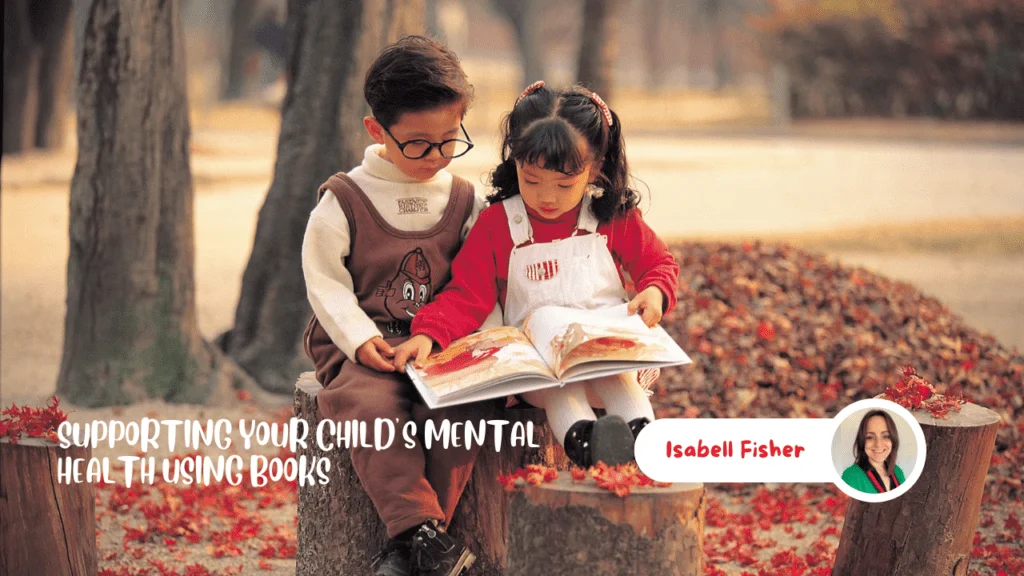
Books offer a great way to support our children’s mental health. In 2008, the National Literacy Trust found that children who enjoy reading and writing are three times more likely to have better mental health than children who do not enjoy literacy.
Stories can transport us to magical places away from the stresses of daily life and can often teach our children emotional intelligence. As a teacher and a mother, I am a huge advocate of using books to teach children about a wide range of topics. Books can offer a lovely way to start conversations about complex situations.
So here are my top five reasons why books are a wonderful way to support a child’s mental health:

Through a book, a child can explore and learn about their own emotions by observing how the characters experience them. There are some superb picture books that can teach children how emotions may feel, how to identify them and normalise all those emotions we feel on a daily basis. Teaching children from a young age these skills and supporting them to develop coping strategies will provide them with a strong emotional foundation which will increase self-confidence and boost self-esteem.
These books support conversations about emotional intelligence:
‘Sometimes: A Book of Feelings’ by Stephanie Stansbie
‘The Colour Monster’ by Anna Llenas
‘The Worrysaurus’ by Rachel Bright
‘My Many Coloured Days’ by Dr Seuss
‘The Problem with Problems’ by Rachel Rooney

Books enable children to see the world through other people’s eyes and better understand the world around them. Books can transport our children into different characters, and this enables them to understand how that character is feeling. Through books we can experience a different gender, ethnicity, culture, and age. This plays an important role in developing understanding and empathy for others.

Life can be unpredictable, and stories can help children process difficult situations they are experiencing themselves. Reading about characters that are going through similar situations can help them understand that they aren’t alone with those feelings and can provide them with guidance based on how others have worked through challenges.
‘Rain Before Rainbows’ by Smriti Halls is a beautiful picture book that children will revisit as they come across difficulties and need reminding that with courage and good friends, good times are never far away.

Books broaden and grow a child’s vocabulary, which enables them to better communicate how they are feeling. ‘The Journal of Developmental and Behaviour Paediatrics’ by Jessica Logan A. R. PhD found that if you read one story a day to your child, they will have heard 290,000 more words than a peer who isn’t read to regularly. Read five stories a day and your child will have heard 1.4 million words than a peer who isn’t read to regularly.
Therefore, the more you read and talk to your children, the better equipped they will be to express through speech or writing how they are feeling.

Books are an excellent way for us all to escape from a stressful day and the same is true for our children. After a full-on day at school or nursery, there is nothing more soothing than curling up with a loved one to read a good book.
A study commissioned by Galaxy chocolate through The University of Sussex found that reading for just six minutes can reduce stress more effectively than listening to music, going for a walk or having a cup of tea. So, by reading with your child daily not only are you reducing any possible anxiety your child may be experiencing but you are also working on your own mental health.
A book doesn’t need to be focused on emotions for it to benefit a child’s mental health. A book full of silliness, which has a child laughing with someone they love, is sometimes exactly what they need after a long day. ‘The Pirates are Coming’ by John Condon is a firm bedtime favourite with my son after a tricky day.
At Little Hands Learning we understand the importance of stories for our children. But we also understand how daunting it is to talk about these complex topics with your child. Therefore, when we send a box with a mental health focus, we will always send activities and conversation starters that will support you and encourage your child to share. By having a book with games and activities to support it, conversations are more relaxed and less stressful, and you’ll find it easier to care for your child’s mental health.

Isabell Fisher is co-founder of Little Hands Learning, an educational and eco-friendly subscription box for children aged three to six years. Every month your child will receive an exciting gift in the post containing a beautiful picture book and everything needed for four engaging and fun activities.
The play-based activities are handcrafted and designed by teachers to focus on key areas of the National Curriculum. The curated books together with the activities help nurture healthy minds and encourage early literacy skills, giving children the best start to their education. www.littlehandslearning.co.uk
Website: www.littlehandslearning.co.uk
Facebook: https://www.facebook.com/littlehandslearninguk
Instagram: @littlehandslearninguk
Pinterest: www.pinterest.co.uk/littlehandslearninguk/



Comments (0)